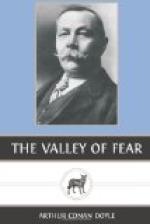One policeman was indeed after him already; but the incident, as luck would have it, did the adventurer a great deal more good than harm. After the first introduction there were few evenings when he did not find his way to McGinty’s saloon, there to make closer acquaintance with “the boys,” which was the jovial title by which the dangerous gang who infested the place were known to one another. His dashing manner and fearlessness of speech made him a favourite with them all; while the rapid and scientific way in which he polished off his antagonist in an “all in” bar-room scrap earned the respect of that rough community. Another incident, however, raised him even higher in their estimation.
Just at the crowded hour one night, the door opened and a man entered with the quiet blue uniform and peaked cap of the mine police. This was a special body raised by the railways and colliery owners to supplement the efforts of the ordinary civil police, who were perfectly helpless in the face of the organized ruffianism which terrorized the district. There was a hush as he entered, and many a curious glance was cast at him; but the relations between policemen and criminals are peculiar in some parts of the States, and McGinty himself, standing behind his counter, showed no surprise when the policeman enrolled himself among his customers.
“A straight whisky; for the night is bitter,” said the police officer. “I don’t think we have met before, Councillor?”
“You’ll be the new captain?” said McGinty.
“That’s so. We’re looking to you, Councillor, and to the other leading citizens, to help us in upholding law and order in this township. Captain Marvin is my name.”
“We’d do better without you, Captain Marvin,” said McGinty coldly; “for we have our own police of the township, and no need for any imported goods. What are you but the paid tool of the capitalists, hired by them to club or shoot your poorer fellow citizen?”
“Well, well, we won’t argue about that,” said the police officer good-humouredly. “I expect we all do our duty same as we see it; but we can’t all see it the same.” He had drunk off his glass and had turned to go, when his eyes fell upon the face of Jack McMurdo, who was scowling at his elbow. “Hullo! Hullo!” he cried, looking him up and down. “Here’s an old acquaintance!”
McMurdo shrank away from him. “I was never a friend to you nor any other cursed copper in my life,” said he.
“An acquaintance isn’t always a friend,” said the police captain, grinning. “You’re Jack McMurdo of Chicago, right enough, and don’t you deny it!”
McMurdo shrugged his shoulders. “I’m not denying it,” said he. “D’ye think I’m ashamed of my own name?”
“You’ve got good cause to be, anyhow.”
“What the devil d’you mean by that?” he roared with his fists clenched.
“No, no, Jack, bluster won’t do with me. I was an officer in Chicago before ever I came to this darned coal bunker, and I know a Chicago crook when I see one.”




